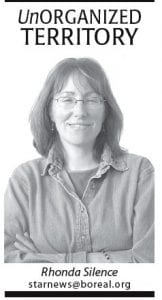It is hard to believe that the citizens of Minnesota will be voting in the primary election in just over two weeks. If you are like me, you are probably trying to decide whom to vote for—especially for county commissioner. I live in commissioner district 3—the one with seven candidates to pick from.
Having a lot of choice is a good problem. That is how democracy should work. But it doesn’t make voting easy.
I thought that I would be able to make my decision while asking questions of the candidates and recording their answers for the July 3 issue of the News-Herald.
Fortunately for the political future of our county, that was not the case. There was no candidate to immediately rule out. All of the candidates provided serious, well thought out answers to my questions.
Not to worry, I thought. I knew I would be taking part in the election forum at the Arrowhead Center for the Arts on Tuesday, July 20. I was pretty sure that hearing the candidates answering questions in front of a live audience would help me weed out at least one or two possibilities. It turned out that is not necessarily true.
I may not have agreed with everything every candidate said, but I again respected the thoughtful manner in which answers were presented. I liked how all of them fielded some pretty tough questions from the public. It was interesting to learn where each aspirant stands on current issues.
It was a little difficult to remain impassive, as a newsperson/moderator must do. I was standing down in front, close to the candidates so I could pass the audience’s questions to moderator Jay Andersen. From my vantage point, I could make eye contact with the candidates when they looked my way. There were a few times when I was tempted to smile and nod or clap my hands—or roll my eyes. But I didn’t. Instead I listened intently, trying to decide whose answers most closely matched what I would have said.
I realized that the 90 seconds each candidate had to answer a question was sometimes not long enough. I still think the forum format is good—there must be rules that all abide by to have a level playing field. During the forum, candidates are tested on their ability to speak concisely as well as knowledgeably.
But I don’t think citizens should stop asking questions just because the forum is over. Thequestions at the election forums are just starting points. If you have questions—about the golf course, about hiring an administrator, about use of county vehicles, about property taxes, about employee issues, about broadband, about rain gardens, about zoning matters—talk to the candidates. Ask every question you can think of.
See who is accessible and who has done his or her research. See who can carry on a discussion with a constituent. See who gives you answers you want to applaud and who makes you want to roll your eyes. You have a few more weeks to decide.
Make the most of them.
Voters don’t decide issues,
they decide who will decide issues.
George Will



Loading Comments